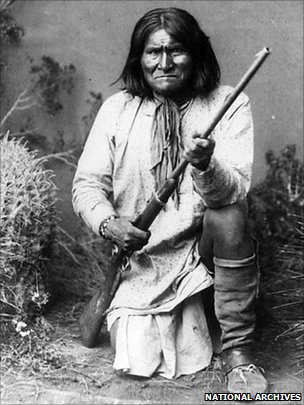Gold Digger
Member
- May 21, 2009
- 86
- 8
RIP Geronimo, may your spirit live on in the youth of today!
and what does "geronimo" mean?
kwani Osama bin Laden alipewa jina hilo kla geronimo wakati anasakwa!!!
doh!! RIP brother......wish you could wait and witness new Tanzania!!!

Dah! huyu Elmer Pratt ndiye alikuwa akiishi Arusha ana shamba lake kule kijijini njia ya kwenda Kenya? au namfananisha.. Nawakumbuka sana kundi lao walipoigia Bongo miaka ya sabini pamoja na kina fat Joe, Yussuph na wengineo ambao nimesikia wamehamia Nairobi Kenya.
Hata sielewi nikujibu nini? labda nisome vizuri mkuu wangu kwa sababu nilichoandika ni kitu nachokijua sii kusimuliwa. Wewe umeelewa nini niliposema 70's. Fat Joe alikuwa akichoma nyama pale Princess enzi za disco la baharia mmoja akiitwa Edo, nilikutana naye tena mwaka 1995 Nairobi. Kina Yussuph tulikuwa pamoja mjini na nimejifunza mengi sana kuhusu Ubaguzi Marekani toka kwa hawa jamaa toka miaka hiyoo. Halafu nimeuliza kama huyu Elmer ndiye alikuwa akiishi nje ya Arusha kwa sababu nimefika kwake ana shamba na pia mfugaji mzuri..Kigumu kuelewa kipi hapa mkuu wangu!Inakuwaje Mh. Unadai alikuja miaka ya 70s wakati Jamaa Geronimo alikuwa anapigania kesi ya kutungwa dhidi yake na FBI. Jamaa alianza kuangaika na hiyo kesi tangu mwaka 1968 hadi alipohukumiwa 1972.
Mkuu kinachonitatiza ni kwamba kwa mujibu maelezo ya vyombo vya habari hapa USA ikiwemo NY times na Mwanasheria wake ndg. Stuart Hanlon ni kwamba jamaa alihukumiwa kifungo cha maisha ila akaja kuachiliwa mwaka 1997 akiwa tayari ameshatumikia miaka 27 ikiwemo miak 8 ya mwanzo akitumikia Solitary Confinement-akiuona mwanga masaa 3 kwa wiki. Maanake ni kwamba jamaa alihukumiwa kuanzia mwaka 1970. Mwaka 2000 alilipwa fidia dola 4.5mil karibia 6 Bil. Za madafu. Baada kulipwa fidia ndiyo akaanza mikakati ya kuja Arusha kuungana na mwanaharakati mwingine haki dhidi ya ubaguzi wa watu weusi nchini USA Pete O'neal aliyekuwa tayari keshatangulia na kupata hifadhi ya ukimbizi wa kisiasa under Mwl. JKN tangia miaka 39 iliyopita. Inawezekana litumia sehemu ya hizo pesa kununua shamba na kuanzisha ufugaji. Na alikuwa ameshaishi karibia muongo mmoja kabla hajatangulia mbele ya haki. This proves he was anaendeleza libeneke la maisha hapo bongo miaka ya 2000's na si 1970's. Anyway, maybe kulikuwa na Jamaa aliyekuwa anafanana jina na Pratt, aliyekuwa anatumia nick name au jamaa mlikuwa mnamfananisha?Hata sielewi nikujibu nini? labda nisome vizuri mkuu wangu kwa sababu nilichoandika ni kitu nachokijua sii kusimuliwa. Wewe umeelewa nini niliposema 70's. Fat Joe alikuwa akichoma nyama pale Princess enzi za disco la baharia mmoja akiitwa Edo, nilikutana naye tena mwaka 1995 Nairobi. Kina Yussuph tulikuwa pamoja mjini na nimejifunza mengi sana kuhusu Ubaguzi Marekani toka kwa hawa jamaa toka miaka hiyoo. Halafu nimeuliza kama huyu Elmer ndiye alikuwa akiishi nje ya Arusha kwa sababu nimefika kwake ana shamba na pia mfugaji mzuri..Kigumu kuelewa kipi hapa mkuu wangu!
Mkuu, Mkandara umenikumbusha mbali sanaHata sielewi nikujibu nini? labda nisome vizuri mkuu wangu kwa sababu nilichoandika ni kitu nachokijua sii kusimuliwa. Wewe umeelewa nini niliposema 70's. Fat Joe alikuwa akichoma nyama pale Princess enzi za disco la baharia mmoja akiitwa Edo, nilikutana naye tena mwaka 1995 Nairobi. Kina Yussuph tulikuwa pamoja mjini na nimejifunza mengi sana kuhusu Ubaguzi Marekani toka kwa hawa jamaa toka miaka hiyoo. Halafu nimeuliza kama huyu Elmer ndiye alikuwa akiishi nje ya Arusha kwa sababu nimefika kwake ana shamba na pia mfugaji mzuri..Kigumu kuelewa kipi hapa mkuu wangu!
Yes aliamini huko yawezekana asili yake ndipo ilipo ni baba wa kufikia wa TUPAC..RIP Pratt